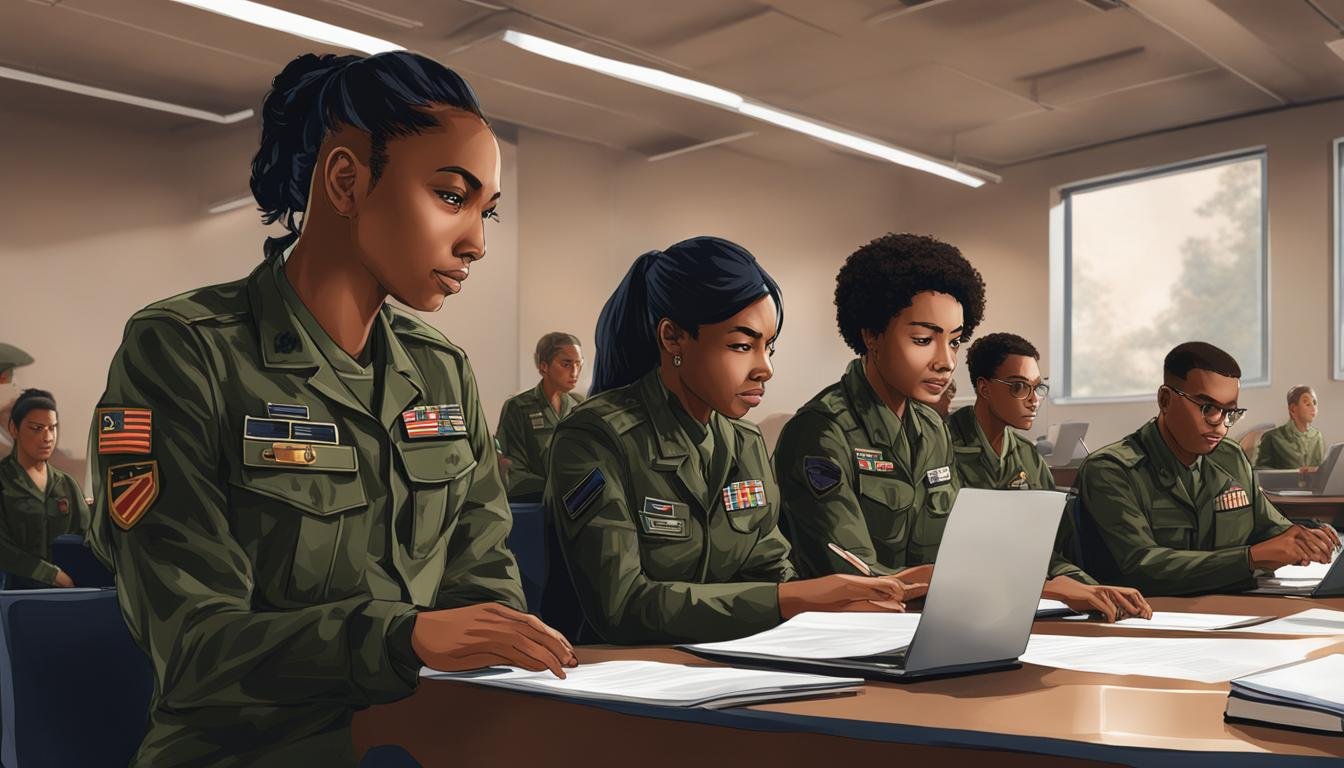When it comes to pursuing higher education as a military student, understanding transfer policies is crucial. Whether you are looking to transfer credits or explore educational benefits, having access to the right resources can make all the difference in maximizing your educational opportunities.
In this section, we will guide you through the various resources available to help you navigate transfer policies specifically tailored for military students. From transfer credit guidelines to military education transfer policies, we’ve got you covered.
Key Takeaways:
- Transfer policies for military students play a crucial role in utilizing education benefits.
- Understanding transfer credit guidelines is essential when transferring college credits.
- The American Council on Education provides credit recommendations for military training.
- Military transcripts are important documents for evaluating prior learning and coursework.
- Researching and interpreting military transcripts can assist in determining credit applicability.
Understanding Transfer Credit
Transferring college credits can be a crucial step for military students seeking to continue their education. Understanding transfer credit policies and guidelines is essential to ensure a smooth transition and maximize the credits earned from previous coursework or military training.
Each college or university has its own transfer credit policies, which determine how credits are evaluated and accepted. It is important for military students to research and familiarize themselves with these policies before transferring credits. This will help them understand which credits will transfer and how they can be applied towards their chosen degree program.
The American Council on Education (ACE) provides credit recommendations for military training and courses. These recommendations can significantly aid the transfer credit process for military students. By aligning military training with college courses, ACE credit recommendations provide a framework for colleges and universities to evaluate and award credits.
When evaluating transfer credits, colleges may consider factors such as the similarity of course content, the rigor of the course, and the accreditation of the institution where the credits were earned. It is important for military students to keep documentation of their previous coursework and military training to support their credit transfer requests. This may include official military transcripts, such as the AARTS, SMART, USCG, or CCAF transcript.
Table:
| Transfer Credit Guidelines | Considerations |
|---|---|
| Course Content | Colleges evaluate if the content of previous courses aligns with their own curriculum. |
| Course Rigor | Colleges assess the academic rigor of previous coursework to determine if it meets their standards. |
| Institution Accreditation | Colleges may consider the accreditation status of the institution where the credits were earned. |
Evaluating Transfer Credits
When submitting transfer credit requests, military students should provide comprehensive documentation, including detailed course syllabi, official transcripts, and any relevant evaluations or recommendations from ACE. This will help colleges and universities make informed decisions regarding their transfer credits.
By understanding transfer credit policies and guidelines, military students can strategically plan their education and make the most of their prior learning. It is important to consult with academic advisors and admissions offices to ensure a successful credit transfer process and a seamless transition into their chosen degree program.
Obtaining and Interpreting Military Transcripts

Obtaining your military transcripts is an important step in navigating transfer credit for your education. Military transcripts, such as the AARTS (Army/American Council on Education Registry Transcript System), SMART (Sailor/Marine American Council on Education Registry Transcript), USCG (United States Coast Guard), or CCAF (Community College of the Air Force) transcript, provide a comprehensive record of your military training and coursework.
To obtain your military transcripts, you can visit the respective websites of the military branches or contact the appropriate offices. These transcripts serve as valuable documentation that can be evaluated for college credit. They outline the specific courses, exams, and certifications you have completed during your military service.
When interpreting your military transcripts, it is helpful to refer to the ACE Military Guide. This online resource provides credit recommendations for military training and courses. It offers a comprehensive database that aligns military training with college courses, helping you understand how your prior learning can be applied towards your degree. By referring to the ACE Military Guide, you can determine the amount of credit you may be eligible to receive based on your military experience.
Understanding the ACE credit recommendations is crucial in making informed decisions about transferring your military training to college credits. It allows you to effectively communicate with college advisors and evaluate which courses you may be able to bypass or substitute using your military experience. By leveraging these resources, you can maximize the credits you transfer and expedite your path towards earning your degree.
Table: Military Transcript Resources
| Transcript Type | Branch | Website |
|---|---|---|
| AARTS | Army | https://jst.doded.mil/ |
| SMART | Navy/Marine Corps | https://jst.doded.mil/ |
| USCG | Coast Guard | https://jst.doded.mil/ |
| CCAF | Air Force | https://www.airuniversity.af.edu/Barnes/CCAF/Display/Article/803247/community-college-of-the-air-force/ |
Military students can find useful resources to address challenges in transfer policy navigation. Many educational institutions offer dedicated support services to help navigate the complex transfer process. Additionally, online forums and veteran organizations can provide valuable insight and advice on transferring credits and finding the right academic path.
Conclusion
Navigating transfer policies can be complex for military students, but there are resources available to help. When it comes to understanding and maximizing your educational benefits, it’s crucial to do thorough research and stay informed.
Military OneSource is an excellent resource that can provide guidance on transferring your education benefits. They can help you navigate the process and connect you with valuable service-specific resources that can assist you in making the most of your educational opportunities.
Additionally, the American Council on Education (ACE) offers credit recommendations for military training. These recommendations can be extremely beneficial when it comes to transferring your credits to a college or university. Understanding how your military training aligns with specific courses can give you a clear path forward in your academic journey.
Remember, your educational benefits are a valuable resource. By familiarizing yourself with transfer policies and utilizing the available resources, you can ensure a smooth transition and make the most of the opportunities that await you.



